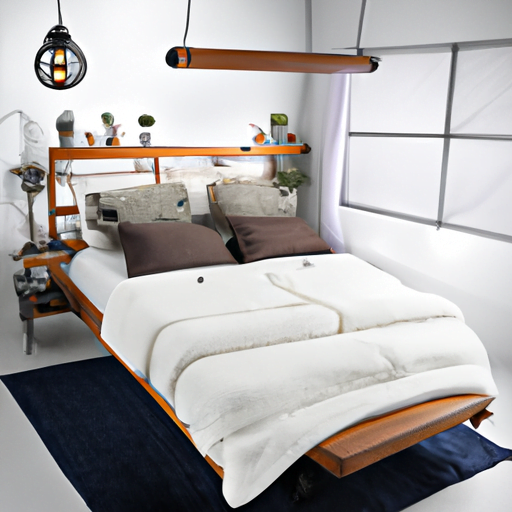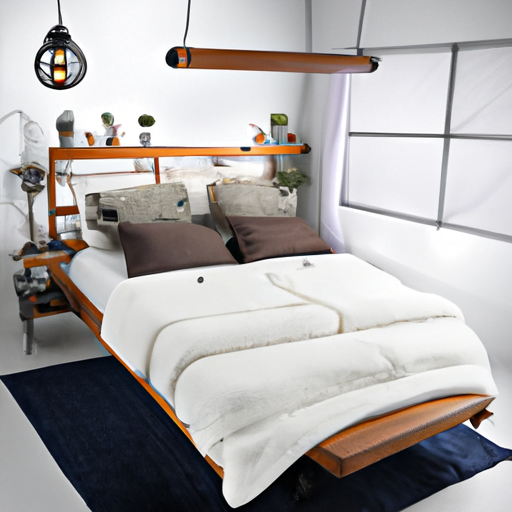Have you ever wondered what it would be like to live off the grid, where you have the freedom to explore and travel whenever and wherever you want? Well, one option that has been gaining popularity is sleeping in a van. But is it really safe? In this article, we will explore the safety of sleeping in a van and provide you with all the information you need to make an informed decision.
When it comes to sleeping in a van, safety is a top concern for many people. After all, you are essentially camping out in a vehicle, which can feel vulnerable and exposed. However, with the right precautions and preparation, sleeping in a van can be just as safe as sleeping in a traditional home. In fact, many van dwellers take great care to ensure their safety and security.
One of the main advantages of sleeping in a van is the ability to choose your location. You can park in designated campgrounds, which often have security measures in place, such as gated entrances and security patrols. Alternatively, you can also park on public lands or in remote areas. It’s important to research the safety of the areas you plan to stay in, as some may have higher crime rates or other risks. Additionally, investing in security measures for your van, such as an alarm system or reinforced locks, can provide an extra layer of protection.
In conclusion, while there are risks involved in sleeping in a van, with proper precautions and research, it can be a safe and fulfilling way to live off the grid. Throughout this article, we will delve deeper into the various safety considerations you should keep in mind if you are considering sleeping in a van. So, if you’re curious to learn more, keep reading!

Exploring the Safety of Sleeping in a Van
Understanding the Trend of Off-Grid Living
Off-grid living has become an increasingly popular lifestyle choice for many individuals seeking a simpler, more sustainable way of life. It involves disconnecting from traditional utilities and opting for self-sufficiency in areas such as energy, water, and waste management. One aspect of off-grid living that has gained attention is sleeping in a van. While this may not be for everyone, it offers a unique opportunity to experience the freedom of mobility and a closer connection with nature.
Advantages of Sleeping in a Van
There are several advantages to sleeping in a van that make it an appealing option for those looking to venture into off-grid living. First and foremost, the mobility and flexibility it provides cannot be overstated. With a van, you have the freedom to travel and explore different locations without the need for traditional lodging. This saves you money and allows you to immerse yourself in nature’s beauty.
Additionally, sleeping in a van can also be cost-effective compared to renting or owning a house. Van living eliminates the need for monthly rent or mortgage payments, making it a financially viable option for those who prioritize simplicity and financial freedom. By sleeping in a van, you can redirect your funds towards experiences and personal growth rather than paying for a fixed location to rest your head.
A significant advantage of sleeping in a van is the connection it fosters with nature. Being able to wake up in a picturesque location surrounded by mountains, lakes, or forests can provide a sense of peace and tranquility that is difficult to replicate in traditional living arrangements. It offers a unique opportunity to disconnect from the noise and distractions of daily life and immerse oneself in the beauty of the natural world.
The simplified lifestyle that comes with sleeping in a van is another advantage that attracts many individuals. Living in a confined space encourages you to reassess your belongings and prioritize only what is truly necessary. This minimalist approach can lead to a decluttered and more mindful existence.
Finally, sleeping in a van also has a minimal environmental impact. By using a smaller living space and relying on renewable energy sources such as solar power, van dwellers can significantly reduce their carbon footprint. This eco-friendly aspect of van living is attractive to individuals who are conscious of their environmental impact and are looking for ways to live more sustainably.
Factors Affecting Safety While Sleeping in a Van
While sleeping in a van can provide numerous advantages, safety is a critical consideration that cannot be overlooked. Several factors can affect the safety of sleeping in a van, and understanding and addressing them is essential for a secure and comfortable living experience.
One factor to consider is the location and parking considerations. Finding safe and legal parking spots is crucial to avoid unwanted fines or possible encounters with law enforcement. Researching designated areas for overnight parking or seeking permission from private property owners can help ensure a hassle-free experience.
Weather conditions and climate must also be taken into account. Extreme temperatures or severe weather events can impact the overall safety and comfort of sleeping in a van. Adequate insulation, heating options, and cooling strategies must be implemented to create a suitable living environment in various weather conditions.
The neighborhood and surrounding environment where you choose to park your van can greatly impact safety. Researching the crime rates and overall security of an area is important to minimize any potential risks. It is advisable to park in well-lit, populated areas and establish a good rapport with fellow van dwellers or residents in the vicinity.
Choosing the Right Van for Safe Sleeping
Selecting the right van for safe sleeping is essential to ensure a comfortable and secure living experience. Different types of vans may offer varying levels of safety and practicality.
When considering the type of van, factors such as size, layout, and condition should be taken into account. A larger van may provide more living space but may also be more challenging to maneuver and park. Assessing your needs and preferences will help determine the best fit for you.
Evaluating the condition and maintenance of the van is crucial for safety. Ensuring that the van has been regularly serviced and is in good working condition reduces the risk of mechanical failures and breakdowns. Additionally, checking for any signs of leaks or structural damage is imperative to maintain a safe and secure living environment.
It is also important to pay attention to safety features when choosing a van. Features such as airbags, anti-lock braking systems, and stability control can enhance the overall safety of the vehicle. Investing in a van with these safety features can provide added peace of mind.
Ensuring Privacy and Security in a Van
Privacy and security are important aspects to consider when sleeping in a van. It is essential to establish measures that protect your privacy and belongings.
One effective method of ensuring privacy is by installing window coverings. This not only provides privacy but also helps regulate the temperature inside the van. Window coverings can range from curtains or blinds to window tints or shades, depending on your personal preferences and needs.
In terms of security, investing in a reliable locking system and anti-theft devices is crucial. Deadbolts or reinforced locks can help prevent unauthorized access, while alarm systems or GPS trackers can deter potential theft. It is also wise to avoid displaying valuable items that may attract unwanted attention.
Maintaining personal safety is another important consideration while living in a van. Being aware of your surroundings, trusting your instincts, and practicing self-defense techniques can contribute to a sense of personal security. Building relationships with other van dwellers can also provide a support system and enhance overall safety.
Installing Safety Features in Your Van
To further enhance the safety of sleeping in a van, installing specific safety features is essential. Consider incorporating smoke and carbon monoxide detectors to ensure early detection of potential hazards. Proper ventilation and air circulation systems are also crucial to maintain good air quality and prevent condensation and mold growth.
Furthermore, keeping a well-stocked first aid kit and emergency equipment on board is important for any medical or unforeseen situations that may arise. Secure storage solutions can help protect your belongings and minimize the risk of injury from loose items during sudden movements.
Managing Temperature and Air Quality in a Van
Maintaining a comfortable and healthy living environment inside a van involves managing temperature and air quality. Proper insulation is key to regulating temperatures, reducing energy consumption, and preventing condensation. Insulation materials such as foam boards, spray foam, or wool insulation can be installed to improve thermal efficiency.
In warmer climates, cooling strategies such as roof vents, fans, or air conditioning units can help combat heat. Adequate ventilation is important to circulate fresh air and remove any stagnant or humid air, thus reducing the risk of mold or mildew growth.
Taking steps to minimize moisture and condensation is crucial for preventing discomfort and potential health issues. This can be achieved through proper ventilation, insulation, and moisture control strategies.
Promoting good air quality is equally important. Regularly cleaning and maintaining air filters, using natural air purifiers such as plants, and ensuring proper ventilation contribute to a healthier living environment.
Addressing Concerns about Personal Safety
Personal safety can be a concern for individuals considering sleeping in a van. While it is essential to prioritize personal safety, it is also important to remember that risks exist in all living arrangements. Taking certain precautions can help minimize these concerns.
Utilizing self-defense techniques and carrying personal protection devices can provide added peace of mind. Engaging in situational awareness, being mindful of your surroundings, and trusting your instincts are also important steps for personal safety.
Building relationships with other van dwellers can create a sense of community and support. Sharing information about safe parking spots, exchanging tips on safety measures, and looking out for one another can help mitigate concerns and foster a sense of security.
Establishing safety protocols is imperative to be prepared for any emergencies that may arise. This includes having a communication plan, knowing the location of emergency services and hospitals, and being aware of local emergency resources.
Emergency Preparedness for Van Dwellers
Being prepared for emergencies is crucial for anyone, but especially for those living in a van. Creating an emergency kit that includes essentials such as food, water, medical supplies, and tools can help you navigate unexpected situations.
Having a reliable means of communication, such as a mobile phone or a two-way radio, is essential to reach out for help in emergency situations. It is also advisable to familiarize yourself with local emergency services and resources in the areas you plan to travel.
Developing a personal emergency plan that outlines procedures for various scenarios can help you act quickly and effectively during stressful situations. This plan should include information on evacuation routes, emergency contacts, and key locations such as hospitals or police stations.
Conclusion: Balancing Comfort and Safety
Sleeping in a van offers a unique way to explore the world while simplifying your lifestyle. By understanding the safety considerations involved and taking appropriate measures, you can enjoy the freedom and adventure that van living provides while ensuring your well-being.
Remember to assess your individual comfort levels and risk tolerance when embarking on this unconventional living arrangement. Finding a balance between comfort and safety will help you make informed decisions that contribute to an enjoyable and secure van dwelling experience.
By carefully selecting the right van, installing necessary safety features, and being mindful of personal security, you can embrace the trend of off-grid living and sleep soundly, knowing that you have taken the necessary precautions to ensure your safety.





